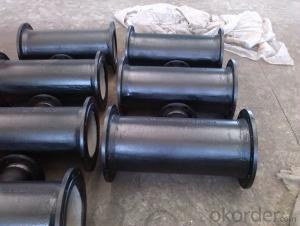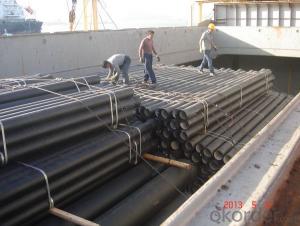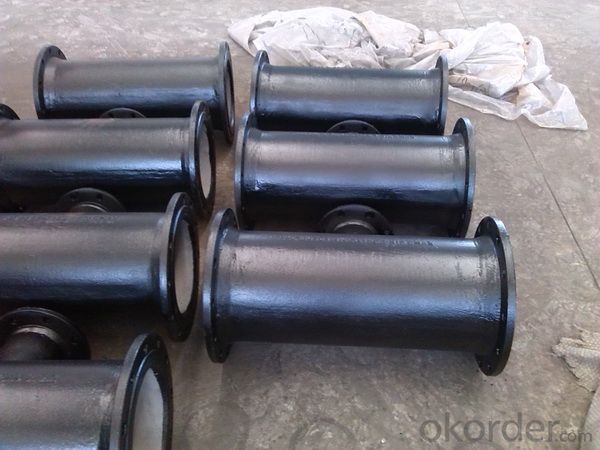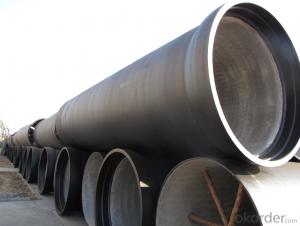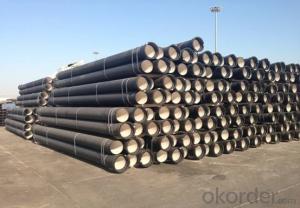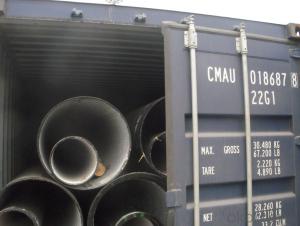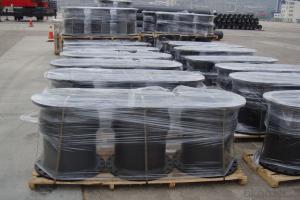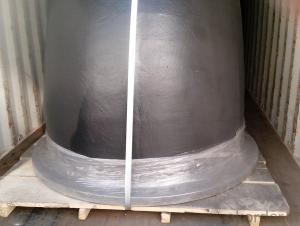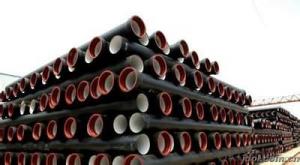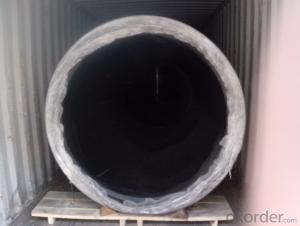DUCTILE IRON PIPE C Class DN 1600
- Loading Port:
- Tianjin
- Payment Terms:
- TT OR LC
- Min Order Qty:
- -
- Supply Capability:
- 30000Tons m/month
OKorder Service Pledge
OKorder Financial Service
You Might Also Like
CNBM ductile iron pipe ranges from DN80-DN1600mm (T-Type, Class K9), effective length 6m, comply with ISO2531 Standard
Company Profile
CNBM International Corporation is the leading production base and renowned supplier of Ductile Iron Water Pipe systems of both potable and waste water in China. We are constantly looking to develop high quality products to ensure the longest service life and wonderful performance.
CNBM Pipelines regard quality as the essential factor leading to successful business. Every pipe is tested in accordance with BS EN545 (water application) or BS EN598 (sewer application). CNBM Pipelines products comply with and are tested according to the relevant European and International Standards. Our pipes are manufactured under the quality management system BS EN ISO 9001. After years of efforts, CNBM Pipelines has built up great reputation in terms of quality and service among customers worldwide
Product Introduction
CNBM ductile iron pipe ranges from DN80-DN1600mm (Tyton, T-Type, Class K7/K8/K9), effective length: 6m, complying with BS EN545/EN598/ISO2531/BS4772.
Specification& Payment terms
Internal lining: Pipes shall have an internal cement mortar lining in acc with ISO4179.
External coating: Pipes shall be externally coated with metallic zinc spray plus a further layer of resin painting to ISO8179.
Gasket: 100% SBR/NBR/EPDM gasket in accordance with ISO4633.
Packing: Pipes from DN100 to DN300 be bundled with steel belts, the others are in bulk.
Payment term: By 30% T/T advance payment + 70% Irrevocable L/C at sight.
Packing: In bulk vessel or in container.
- Q: What are the advantages of using ductile iron pipe over concrete pipe?
- There are several advantages of using ductile iron pipe over concrete pipe. Firstly, ductile iron pipe has a higher strength-to-weight ratio compared to concrete pipe. This means that it can withstand higher pressure and loads while being lighter in weight. This makes it easier to handle and install, reducing labor costs and time. Secondly, ductile iron pipe has superior corrosion resistance compared to concrete pipe. It is less likely to rust or degrade over time, which increases its lifespan and decreases the need for frequent repairs or replacements. This makes it a more cost-effective option in the long run. Additionally, ductile iron pipe has better flexibility and resilience compared to concrete pipe. It can withstand ground movement, settling, and other environmental factors without cracking or breaking. This makes it more durable and less prone to damage, reducing maintenance and repair costs. Moreover, ductile iron pipe has a smoother interior surface compared to concrete pipe. This results in improved flow characteristics and reduced friction, allowing for more efficient transportation of fluids. It also minimizes the risk of clogs or blockages, ensuring uninterrupted flow. Furthermore, ductile iron pipe is highly versatile and can be used in a wide range of applications. It is suitable for both above-ground and underground installations, making it ideal for various infrastructure projects such as water supply systems, wastewater treatment plants, and industrial applications. Overall, the advantages of using ductile iron pipe over concrete pipe include its higher strength-to-weight ratio, superior corrosion resistance, better flexibility and resilience, smoother interior surface, and versatility. These benefits make it a reliable and cost-effective choice for various infrastructure projects.
- Q: Can ductile iron pipes be made into clear tubes?
- Of course, you can also use as a pipe, but because of the appearance of cast iron pipe is not very beautiful, but relatively brittle, by external impact or bad insulation cold winter break, so according to your use of the environment to determine.
- Q: Can ductile iron pipes be used for underground drainage systems?
- Indeed, underground drainage systems can utilize ductile iron pipes. Ductile iron, being a robust and enduring substance, exhibits resistance to corrosion, rendering it appropriate for subterranean applications. Possessing remarkable tensile strength, it can endure substantial loads and pressures, thereby making it an excellent choice for drainage systems that encounter significant flow rates or necessitate substantial burial depths. Moreover, ductile iron pipes boast an extended lifespan, thereby decreasing the requirement for frequent maintenance or replacement. All in all, ductile iron pipes prove to be an unwavering and efficient option for underground drainage systems.
- Q: How does ductile iron pipe perform in areas with high ground movement?
- Ductile iron pipe performs well in areas with high ground movement due to its inherent flexibility and strength. Its ability to bend and absorb ground movements makes it less susceptible to cracking or breaking compared to other rigid pipe materials. Additionally, the material's high tensile strength and durability ensure that it can withstand the stresses caused by ground movement without compromising its structural integrity.
- Q: How does ductile iron pipe perform in areas with high soil consolidation?
- In areas characterized by significant soil consolidation, the performance of ductile iron pipe is outstanding. This is because ductile iron possesses inherent strength and flexibility, making it an ideal choice for underground installations where soil consolidation is prevalent. The ground in areas with high soil consolidation often undergoes substantial movement and settling, presenting challenges for buried infrastructure. However, ductile iron pipe's unique characteristics enable it to withstand these conditions effectively. To begin with, the high tensile strength of ductile iron allows it to resist external forces and pressures exerted by the surrounding soil. This strength ensures that the pipe maintains its structural integrity even in areas with high soil consolidation. Furthermore, ductile iron exhibits exceptional resistance to deformation, enabling it to handle ground movement without cracking or breaking. Its flexibility allows the pipe to absorb lateral forces associated with soil consolidation, preventing any damage. Additionally, ductile iron pipe is renowned for its durability and long service life. It is highly resistant to corrosion, abrasion, and chemical attacks, further enhancing its performance in areas with high soil consolidation. This resistance guarantees that the pipe remains intact and fully functional, even in challenging soil conditions. Moreover, the joints of ductile iron pipe are designed to provide secure and leak-free connections. This eliminates the risk of soil infiltration, which can exacerbate soil consolidation and lead to further ground movement. In conclusion, ductile iron pipe is exceptionally suited for areas with high soil consolidation due to its strength, flexibility, durability, and leak-free joints. Its ability to withstand ground movement and maintain structural integrity makes it a reliable choice for underground installations in such conditions.
- Q: Can ductile iron pipes be used for underground sewage systems?
- Yes, ductile iron pipes can be used for underground sewage systems. Ductile iron is a type of cast iron that has enhanced flexibility and strength, making it suitable for various applications, including sewage systems. Ductile iron pipes offer several advantages for underground sewage systems. Firstly, they have excellent corrosion resistance, which is crucial in sewage systems where the presence of moisture and chemicals can cause corrosion over time. This resistance to corrosion ensures the long-term durability and reliability of the pipes. Secondly, ductile iron pipes have high tensile strength, allowing them to withstand the pressure and stress that can occur in underground sewage systems. They are resistant to ground movements, such as soil settling or shifting, which can cause damage to other types of pipes. Furthermore, ductile iron pipes have a smooth internal surface, which results in a better flow capacity and reduces the likelihood of clogging or blockages in the sewage system. This smooth surface also helps to minimize the accumulation of debris and sediment, reducing the need for frequent maintenance and cleaning. Another important factor is that ductile iron pipes are available in various sizes and can easily be connected using a range of joint systems, allowing for flexibility in designing and constructing underground sewage systems. In summary, ductile iron pipes are an excellent choice for underground sewage systems due to their corrosion resistance, high tensile strength, smooth internal surface, and ease of installation.
- Q: What material is ductile cast iron 235A?
- Nodular cast iron by spheroidization and inoculation by spherical graphite, effectively improve the mechanical properties of cast iron, especially the plasticity and toughness increased, resulting in higher than carbon steel. The strength of nodular cast iron is a kind of high strength cast iron material developed in 50s twentieth Century, its comprehensive performance is close to the steel. It is based on its excellent performance, has been successfully used in casting complex stress, strength, toughness and wear resistance requirements of the higher parts. Ductile iron has been the rapid development of cast iron material for application of gray cast iron, only very widely. The so-called "iron steel", mainly refers to the ductile iron.
- Q: What is the difference between a PE fire hose and a ductile iron pipe?
- Cast iron pipe: cast pipe made of cast iron. Cast iron pipes are used for water supply, drainage and gas transmission lines. They include cast iron pipes and pipe fittings. Labor intensity is small. According to the casting method, it is divided into continuous cast iron pipe and centrifugal cast iron pipe, in which the centrifugal cast iron pipe is divided into sand mould and metal type two kinds. Divided into gray cast iron pipe and nodular cast iron pipe according to different material. According to the interface form, it is divided into flexible interface, flange interface, self anchored interface, rigid interface and so on. Among them, the flexible iron pipes rubber sealing ring; flange interface cast iron pipe flange fixed in the rubber pad, the flange gasket sealing; rigid interface cast iron pipe socket is large, straight pipe is inserted, sealed with cement, this technology has been basically eliminated.
- Q: What is the expected leakage rate of ductile iron pipes?
- The leakage rate of ductile iron pipes can vary depending on several factors, including pipe age, condition, installation quality, and external influences on pipe integrity. However, in comparison to other pipe types, ductile iron pipes are renowned for their durability and low leakage rates. Based on industry standards and studies, well-maintained and correctly installed ductile iron pipes typically have an expected leakage rate of less than 0.5 liters per pipe per day (LPPD). This leakage rate meets the requirements set by regulatory bodies and organizations, and is considered acceptable. It is crucial to emphasize that regular maintenance and inspections are vital in sustaining the low leakage rate of ductile iron pipes. Prompt identification and repair of potential leaks or damages can effectively minimize the overall leakage rate. Moreover, advancements in manufacturing techniques and pipe design have led to the creation of more leak-resistant ductile iron pipes. These pipes may have even lower expected leakage rates than the industry average, further improving their performance and reliability. Ultimately, when properly installed and maintained, ductile iron pipes are a reliable choice for various water distribution and transmission systems, as their expected leakage rate is generally low.
- Q: Are ductile iron pipes suitable for use in brewery facilities?
- Yes, ductile iron pipes are suitable for use in brewery facilities. Ductile iron pipes are durable, corrosion-resistant, and can withstand high-pressure applications, making them ideal for transporting water, steam, and other fluids within brewery facilities. Additionally, the smooth interior surface of ductile iron pipes minimizes friction and prevents the build-up of sediments or organic materials, ensuring the purity and quality of the beer being produced.
Send your message to us
DUCTILE IRON PIPE C Class DN 1600
- Loading Port:
- Tianjin
- Payment Terms:
- TT OR LC
- Min Order Qty:
- -
- Supply Capability:
- 30000Tons m/month
OKorder Service Pledge
OKorder Financial Service
Similar products
Hot products
Hot Searches
Related keywords
